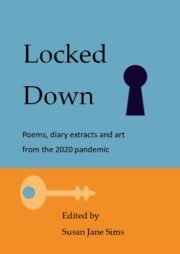Tikki Tikki Man by Caroline Carver ISBN 978-0-9568969-4-0 Published by Ward Wood Publishing
Reviewed by Susan Jane Sims
– even weeds are stronger than I am –
she says – I’m not like them
I don’t want to push through concrete
I don’t want to find the light
Tikki Tikki Man, p.23
The above words from a pre-pubescent child will remain with me for a long time because it feels so desperately sad for a child to have reached a point where she no longer wants to grow. As a counsellor I have worked with many adults who are still coming to terms with childhood abuse, and I know that it considerably reduces the capacity to enjoy life, and to be able to grow up and have healthy relationships.
Maia, the main character in this vivid poetic narrative by Caroline Carver, is a vulnerable child who has become the victim of a paedophile or perhaps a paedophile ring. (The latter is hinted at.) We see the child Maia both in the immediate aftermath of this abuse, with a loss of interest in her surroundings, and in learning, and as she was prior to the advent of the man the children refer to as “Tikki Tikki Man”, a time where she can sit innocently in the bath “legs wide apart” as “Alma, the Jamaican nanny scrubs her back, showing off because she’s learnt a new word the day before.
– See I’m lots of islands – she says
– I’m an archipelago [p.27]
Even then there is the hint of darkness when Alma draws attention to the fact that “a river of blood going flow down there one day”. In the normal course of events this might even be looked forward to as a normal part of growing up. In the light of what we already feel we know at this stage, it feels like a threat.
In the manner of abusers, the “Tikki Tikki Man”, who drops by when his ship is in (p.18) infiltrates his way into the children’s lives by making friends with Maia’s widowed father who is himself lonely and vulnerable. When the children are told off for being rude to this new “friend” there appears to be no escape:
we’re standing at the edge of a cliff
our backs to all the safe places
and Maia’s father is full of pain [p.36]
In the chapter entitled: Illusory City, an anonymous child places her hand in the hand of the narrator’s, an act symbolising how easily children put their trust in adults, and proceeds to ask a series of questions about “winkles crawling in and out of caves” and “slimy trails”, about “pale white worms” and “sea-urchins with black bristles”. She asks if there are “pictures” and if there are “fingers poking in and out of holes” in the narrator’s world, and all following on from the first unsettling question:
– are there men in your city – she asks
– are there chat rooms? [p.15]
The mention of chat rooms of course puts the narrative firmly into this present technological age. This could be my child, the reader will think, or a child I hold dear, at risk of being lured into the degrading and criminal world of child abuse through the internet.
Like in many compelling narratives (but not so common in a book of poems), this chapter of the book sets the tone, with writing that discomforts, intrigues and inevitably draws the reader forward into the next section or chapter, where in this case there is a more recognisable beginning to Maia’s story, and an introduction to the terrifying core event, never explicitly described, around which the narrative is built. In reading Tikki Tikki Man, I found myself returning to this first section again and again just as Maia and her friend do later as young adults. Once more it feels so sad that even within an illusion of something as inviting as a city, that can be whatever you want it to be, (and Carver gives us a wonderful description of valleys and orchards leading to this magical place, a castle with a “great hall” and within its confines “a thousand roses”, even beds that are as “thoughtful as clouds” – how wonderful is that?) there is always the hint of the danger and the darkness that will inevitably follow:
….this is a place where
like the world outside
autumn follows the benevolence of summer days [p.15]
The world of Tikki Tikki Man is complex; not an easy read but one well worth persisting with not least for some beautiful lines like this:
this breath
is like fretted water
creeping over oyster shells [p.39]
I have read this book three times in all, the first on a wet day in London hidden away inside a Moroccan Café, in an Islington side street. I delayed my train so that the first reading would be in one sitting and the café provided shelter, plenty of cups of tea and the feeling of being somewhere both strange and hidden, appropriate to the subject matter. My most recent reading was in the healing environment of a ladies spa in Devon and by then I felt I had accompanied Maia on this journey, as I might do with a client, witnessing her changing from a girl so afraid of life that she will respond to a neighbour’s bizarre comment by ripping her own previously precious waist length hair from its scalp until it bleeds and setting fire to it [p.48], to a young woman in the first stages of the healing process, able at last to be able to take her clothes of and swim naked with a friend.
Tikki Tikki Man provides a context for the abuse and explores the circumstances in which a child might become open to exploitation. It also effectively draws on the symbolism of doors and doorways. The phrase “Open Sesame”, taken from a tale in 1001 Arabian Nights leads to a magical place but also a place of temptation from which there is no going back and “the Tikki Tikki Man /is a professional/ opening new doors/one by one”, as he tumbles around on the floor with the children, his hands “straying over places/where [their]breasts will come”. [p.18]
The breadth of this book encompassing as it does in just over fifty pages of poetry, Maia’s journey across vast distances (the poems take us from Jamaica to Scotland, to Paris, and eventually to Canada), and the use of real spoken language from those cultures interspersed between the narrative, adds a particularly interesting dimension.
where this nonsense come from
why she think she so special?
soon she say
– why don you like this unicorn
lying like sweet innocence
head in my lap
this babe got delusions man
long time since she been virgin [p.49]
This is a device that Carver also employed to good effect in Ju Ju Baby, a poem commended in the National Poetry Competition in 2010.
I think many readers will recognise a voice or perhaps a myriad of voices from their own past when they read this. Sometimes it is hard to pinpoint. It may be a parent, it may be those other adults trusted to look after us, nannies, child-minders, teachers, neighbours, however it is there urging us to keep in line or sometimes making us do the things we don’t want to do. This book not only offers an insight into childhood abuse, why it happens and what circumstances make it possible, it also explores the powerful influences that surround us throughout our lives and to which we are particularly susceptible as children. It is a book about a specific evil present in our society, yet at the same time it is a book about the force for good that comes with true friendship.
Susan Jane Sims is the founder of Poetry Space (www.poetryspace.co.uk.
The above article previously apppeared in Lapidus Journal: March 2013. For informnation on Lapidus: the organisation for health and wellbeing through creative reading and writing please go to www.lapidus.org.uk Members receive the online journal three times a year as well as the opportunity to network and attend national and local events. At £30 per year membership is great value if you are fascinated by the link between creativity and wellbeing, and want to learn and develop a career withing this field, or simnply as part of your own personal development.







